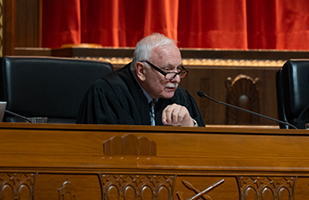Sixth District Judge Grateful for Supreme Court Assignment

Sixth District Court of Appeals Judge Thomas Osowik

Sixth District Court of Appeals Judge Thomas Osowik
Judge Thomas Osowik of the Sixth District Court of Appeals expressed both gratitude, and a deep sense of responsibility as he prepared for his third assignment at the Ohio Supreme Court.
Drawing on decades of professional experience, spanning the appellate, municipal, and common pleas courts—this experience is a prestigious milestone in Osowik’s distinguished judicial career.
“It’s an incredible honor,” Osowik said. “Every level of the judiciary offers something different, but the Supreme Court is where it all comes together.”
A Toledo native, Judge Osowik was raised in a working-class neighborhood by his father, a barber, and mother, a housekeeper. As a first-generation college student, he carries his experiences and background into his work.
“My interest in the law had to do with trying to help people out, and that’s how I really got into becoming a lawyer,” Osowik recalled.
After practicing as a solo attorney for nearly nine years in Northwest Ohio, he saw firsthand how the judiciary functioned, and believed he could contribute meaningfully from the bench.
He approached his assignment at the Supreme Court with meticulous attention and a sense of responsibility.
“I prepared for this case just like I would for any other. Every case is different, every ruling matters, and it’s a privilege to serve.”
His assignment followed Justice Jennifer Brunner’s recusal from a pair of cases. One was Disciplinary Counsel v. Norton, in which an attorney facing sanctions objected the length of his recommended suspension. The other, State v. Clinkscale, examined whether jail-time credit can reduce the waiting period before judicial release requests can be made. Chief Justice Sharon L. Kennedy selected Osowik to hear both cases. The Ohio Constitution grants the chief justice the authority to assign an appellate judge when a justice recuses.
“This is an incredible opportunity,” Osowik said. “I’ve had the privilege of serving at every level of the judiciary, but the Supreme Court brings an entirely different level of significance. Every decision made here will have a lasting impact not just in our district, but across the state.”
Transitioning from Trial to Appellate Courts
Transitioning from municipal to common pleas, Osowik has worked on cases at every level of the judiciary, polishing his broad perspective of legal proceedings.
“The biggest transition was the depth of the significance of the trials,” Osowik explained. “In common pleas, every case could result in a substantial period of incarceration, so nearly every case went to a jury trial.”
He also noted the increased complexity of civil cases in common pleas court, requiring careful docket management to keep cases moving efficiently.
Osowik believes his work as a trial judge shaped his approach on the bench.
“Having been a practicing lawyer, particularly as a solo practitioner, I know what it’s like to stand before a judge, advocating for a client. As a judge, I always strive to be the kind of judge I would want to appear in front of.”
The Appellate Experience
Currently, Osowik is serving his 18th year at the Sixth District. He describes his work as extremely rewarding.
“You may initially approach a case with a particular perspective, but interacting with other judges can challenge your views and help you arrive at a more well-rounded decision.”
Advice for Aspiring Judges
For law students and young lawyers hoping to one day don the judicial robe, Osowik offers simple but valuable advice.
“Go out and practice law first. Gain experience, understand the system, and develop a sense of how cases work from all angles,” he said.
Leaving With a Legacy
Osowik’s impact on the judiciary has been–and will continue to be undeniably meaningful. From presiding over appellate decisions to his early career in municipal court, Osowik’s work reflects an outstanding commitment to public service, and fairness.
“This job has been an incredible privilege,” Osowik said. “I’ve learned so much, and I hope I’ve made a difference.”
Osowik is a husband and father outside of the courtroom. He and his wife, a physician, have raised four sons. While preparing for his role at the Supreme Court, Osowik sought to maintain his values while staying grounded by his family
“At the end of the day, the most important thing is fairness. That’s what I’ve always tried to uphold.”


